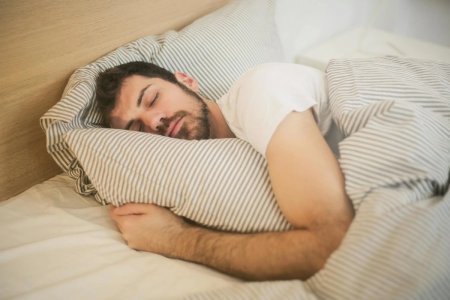Tired of restless nights? Try these 4 natural, caveman-inspired sleep tips
By
Veronica E.
- Replies 0
Tossing and turning at 2 a.m.? You’re not alone.
Many older adults struggle to get the rest they need—whether it’s falling asleep, staying asleep, or just feeling rested when morning comes.
But instead of reaching for pills or the latest sleep gadget, it may help to look back—way back—to the natural rhythms our ancestors followed.
They didn’t have alarms, blue light, or busy calendars.
They listened to their bodies, slept in sync with the sun, and woke up feeling refreshed.
Inspired by those simpler patterns, researchers and sleep experts are now encouraging what some call “caveman-style sleep”—not living in a cave, but restoring sleep by returning to natural habits.
Here are four science-backed ideas to help you fall asleep more easily and wake up feeling better.

Waking up in the middle of the night isn’t always a bad sign.
In fact, in pre-electricity times, many people naturally had two periods of sleep with a short wakeful break in between.
Today, it only becomes a problem if you start to stress about being awake.
Instead of lying there frustrated, try reading something light, listening to calming music, or simply enjoying the quiet.
The less pressure you put on yourself to sleep instantly, the more likely it is that sleep will return naturally.
There’s a lot of talk about needing “8 hours” of sleep—but the truth is, sleep needs vary.
Some people feel great on 6 hours, while others need more.
What matters most is how rested you feel during the day.
Here’s a practical tip:
Start by estimating how many hours you usually sleep (not just time spent in bed), and add 30 minutes.
Try going to bed and waking up during that window for a week. If you still feel tired, add another 15–30 minutes. If you feel better, you’ve likely found your sweet spot!
This technique helps build “sleep pressure”—that natural urge to sleep—by limiting long stretches of restless time in bed.
Our bodies follow a 24-hour rhythm called the circadian rhythm, which is influenced by light, darkness, and routine.
But modern life—artificial lights, screen time, and late-night snacks—can throw it off.
To reset your inner rhythm, try this:
Get natural light in the morning, especially in the first hour after waking up. At night, dim the lights, limit screen time, and allow your body to wind down.
If your schedule allows, match your daily routine—like meals and exercise—to when you naturally feel most alert and relaxed.
Our ancestors slept in total darkness, without glowing clocks or blinking electronics.
Recreating that dark, cool setting can encourage your body to release melatonin, the hormone that signals it's time to sleep.
Use blackout curtains, silence noisy devices, and consider a sleep mask if you’re sensitive to light.
A slightly cool room (around 60–67°F) can also make it easier to fall—and stay—asleep.
Good sleep is about more than just feeling rested.
It supports memory, immune health, mood, and even heart health.
Studies show that older adults who sleep fewer than six hours a night may have higher risks for chronic conditions.
That’s not to scare you—but to remind you how important it is to make sleep a priority.
And the good news? You can take small steps starting tonight to improve your sleep naturally!
Read next: Sleep like this and you might be damaging your health–a doctor’s shocking warning!

Have you found any natural sleep habits that work for you? Have you tried adjusting your bedtime routine or creating a darker sleep space? Share your experiences and questions in the comments below. The GrayVine community is always here to listen and support—because a better night’s sleep is something we all deserve.
Many older adults struggle to get the rest they need—whether it’s falling asleep, staying asleep, or just feeling rested when morning comes.
But instead of reaching for pills or the latest sleep gadget, it may help to look back—way back—to the natural rhythms our ancestors followed.
They didn’t have alarms, blue light, or busy calendars.
They listened to their bodies, slept in sync with the sun, and woke up feeling refreshed.
Inspired by those simpler patterns, researchers and sleep experts are now encouraging what some call “caveman-style sleep”—not living in a cave, but restoring sleep by returning to natural habits.
Here are four science-backed ideas to help you fall asleep more easily and wake up feeling better.

Getting better sleep may be less about modern fixes—and more about returning to the simple habits our ancestors followed. Image Source: Pexels / Andrea Piacquadio.
1. Don’t panic if you wake up during the night
Waking up in the middle of the night isn’t always a bad sign.
In fact, in pre-electricity times, many people naturally had two periods of sleep with a short wakeful break in between.
Today, it only becomes a problem if you start to stress about being awake.
Instead of lying there frustrated, try reading something light, listening to calming music, or simply enjoying the quiet.
The less pressure you put on yourself to sleep instantly, the more likely it is that sleep will return naturally.
Also read: Sleep better instantly: The secret sleeping position experts swear by!
2. Find the sleep schedule that works for you
There’s a lot of talk about needing “8 hours” of sleep—but the truth is, sleep needs vary.
Some people feel great on 6 hours, while others need more.
What matters most is how rested you feel during the day.
Here’s a practical tip:
Start by estimating how many hours you usually sleep (not just time spent in bed), and add 30 minutes.
Try going to bed and waking up during that window for a week. If you still feel tired, add another 15–30 minutes. If you feel better, you’ve likely found your sweet spot!
This technique helps build “sleep pressure”—that natural urge to sleep—by limiting long stretches of restless time in bed.
Also read: Struggling with sleep? Discover the reasons you're waking up at 3AM
3. Work with your body’s internal clock
Our bodies follow a 24-hour rhythm called the circadian rhythm, which is influenced by light, darkness, and routine.
But modern life—artificial lights, screen time, and late-night snacks—can throw it off.
To reset your inner rhythm, try this:
Get natural light in the morning, especially in the first hour after waking up. At night, dim the lights, limit screen time, and allow your body to wind down.
If your schedule allows, match your daily routine—like meals and exercise—to when you naturally feel most alert and relaxed.
4. Create a cave-like sleep environment
Our ancestors slept in total darkness, without glowing clocks or blinking electronics.
Recreating that dark, cool setting can encourage your body to release melatonin, the hormone that signals it's time to sleep.
Use blackout curtains, silence noisy devices, and consider a sleep mask if you’re sensitive to light.
A slightly cool room (around 60–67°F) can also make it easier to fall—and stay—asleep.
Also read: The secret to your best sleep ever—doctors swear by this!
Bonus tips for better sleep
- Don’t stare at the clock. Turn it away from your bed to avoid the stress of watching the minutes pass.
- Keep moving during the day. Light exercise, gardening, or walks help your body feel naturally ready for rest.
- Stick to a routine. Going to bed and waking up at the same time—even on weekends—can improve long-term sleep quality.
Good sleep is about more than just feeling rested.
It supports memory, immune health, mood, and even heart health.
Studies show that older adults who sleep fewer than six hours a night may have higher risks for chronic conditions.
That’s not to scare you—but to remind you how important it is to make sleep a priority.
And the good news? You can take small steps starting tonight to improve your sleep naturally!
Read next: Sleep like this and you might be damaging your health–a doctor’s shocking warning!
Key Takeaways
- Lying awake at night isn’t always a problem; people in natural settings often experience this, and it becomes an issue only when it causes stress or anxiety.
- Figuring out your personal sleep needs—and adjusting your time in bed accordingly—can improve restfulness and break the cycle of insomnia.
- Following your body’s natural circadian rhythm by syncing with natural light and consistent routines can help you sleep better.
- Quality sleep is essential for brain function, memory, immune strength, and long-term health as we age.
Have you found any natural sleep habits that work for you? Have you tried adjusting your bedtime routine or creating a darker sleep space? Share your experiences and questions in the comments below. The GrayVine community is always here to listen and support—because a better night’s sleep is something we all deserve.





